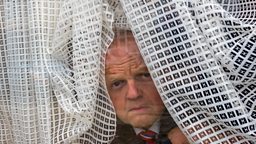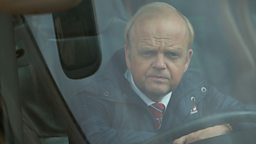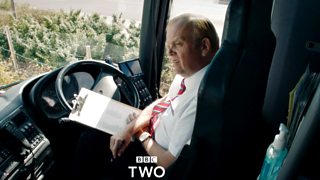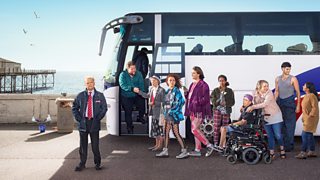Toby Jones on his first foray into writing for television - and why Bognor Regis is the star of the show
Brand new Βι¶ΉΤΌΕΔ Two comedy Don’t Forget The Driver is the first piece of writing from Bafta-winner Toby Jones and Obie Award winner Tim Crouch. Here, Toby Jones (whose acting credits include Infamous, Marvellous and Βι¶ΉΤΌΕΔ Four's Detectorists) talks about his role, Bognor Regis and the experience of co-writing the show.

Tell us about Peter Green…

We’ve tried to reflect the ambiguities that exist in the world in the moment and the anomalies that people find themselves in
Peter is a single parent. He’s estranged from the mother of his daughter - we don’t know very much about her. He works for Bassett’s coaches and he takes his job very seriously. He has to be responsible about timings. He has to worry about the safety of strangers. He has to take care in life. These responsibilities weigh quite heavily on him. During the course of these six episodes, other responsibilities begin to appear to him - not least his mother, who is ailing, his daughter Kayla, whose situation is becoming more complicated, and by a strange visitor who appears to him at the end of episode one.
Is this your first foray into writing?
It’s certainly the first time I’ve written for television. Tim and I met at the National Theatre about 20 years ago, when we were both beginning to write shows for ourselves. We got on very well and talked a lot about the challenges of writing and performing your own work. We then left it for two decades - but he got in touch to say he’d had an idea for something.
He grew up in Bognor and mentioned that Bognor had a webcam on its beach. He said he sometimes communicates with his brother, who lives in Sweden and is homesick for the town. He’ll go down to the beach and speak to him on the mobile while waving at him. His brother watches him live on the webcam. I found this idea strange and slightly unsettling, but also quite touching. So we sat down to see if we could write something together, and the story emerged really quickly, around webcams and coach drivers.
Is it a political story?
Well it’s a comedy. We wrote it as a comedy, but like everyone who’s trying to write anything now, whether it’s a novel, a play, or a piece of comedy, you’re affected by what’s going on in the world. We didn’t want to shoehorn politics into the show - but when you’re dealing with a coastal town the show becomes political whether you like it or not.
We’ve tried to reflect the ambiguities that exist in the world in the moment and the anomalies that people find themselves in - trying to find work, trying to find a place to belong. We’ve tried to find the funny side of that and looking at the contradictions of it all. It’s not political with a capital P, but politics does play a part in it.
How important is Peter’s occupation to his characterisation?
I’ve done a lot of coach driving lessons and I’ve taken my test a couple of times. When you start studying to be a coach driver you think it’s just an everyday job, but there’s this central idea that you have to be responsible for the safety of strangers - and often misbehaving strangers, or strangers who don’t even acknowledge your existence. You have to take your job very seriously, it’s not something you can do lightly.
That had an impact on the way we wrote and constructed the character. However serious or farcical the situation he gets into, he has to show up for work and he cannot be late. He can’t ride on any of that stuff. And like a lot of people in the world of work, he’s under pressure - he can’t lose his job. He has responsibilities. It requires a certain level of patience and they train you in this. That’s a big part of playing Peter.

Has co-writing the show changed the way that you operate on set?

You’d probably have to ask other people! But it’s true, when you’ve been part of the writing team, you do have this strange relationship with every single scene whether you’re in it or not. You’re very well acquainted with the emotions that led to the scene, the story discussions that went into that scene and the other scenes that have been crushed down and the grains of which have become that scene… you’re very aware of the history of each scene.
I know the character inside out, because I’ve discussed everything that leads up to him. Even with his twin brother, I know exactly how we want that character to act in relation to Peter.
Why Bognor?
Any British seaside town has an emotion built into it. For the British it’s the end point of where you belong. We’re an island culture and as soon as you’re on a coastline, you’re aware of everything else that’s just out there.
Bognor Regis was a royal resort. In the past, the king would come here, but now there are brightly coloured funfair rides. It’s still a fine town, although slightly depressed in places. But most of these seaside towns seem depressed when it’s not sunny. There’s a faded grandeur to Bognor. We’re living at a time when Britain is questioning its identity. The story explores issues about Britain and the rest of the world - and Britain’s comic function in the world. Britain has always been a source of comedy, because we are quite good at laughing at ourselves and the world laughs at us in a way. Bognor also a brilliant name. Bognor!
Did you draw on anyone in particular when you made the series?
We were very keen to avoid using language that has been so overused that it has become emptied of significance. So you’ll never hear the 'B' word
No one from the public sphere, but you do meet people when you’re out on coach trips. We were very keen to avoid using language that has been so overused that it has become emptied of significance. So you’ll never hear the 'B' word [Brexit]. You won’t hear us saying migrant, you won’t hear the word refugee. We were very careful to avoid that, we wanted the action to speak for itself.
These things are in the culture and they happening right now, you don’t need to articulate it. As soon as you do articulate it, you can feel people switching off. I switch off when I think of it. We wanted to avoid people writing off the show, saying it’s any political argument. There is no big political argument in the show. There’s none. It’s about human beings.
-
![]()
Watch the full series
All six episodes of Don't Forget the Driver are now available on Βι¶ΉΤΌΕΔ iPlayer.

